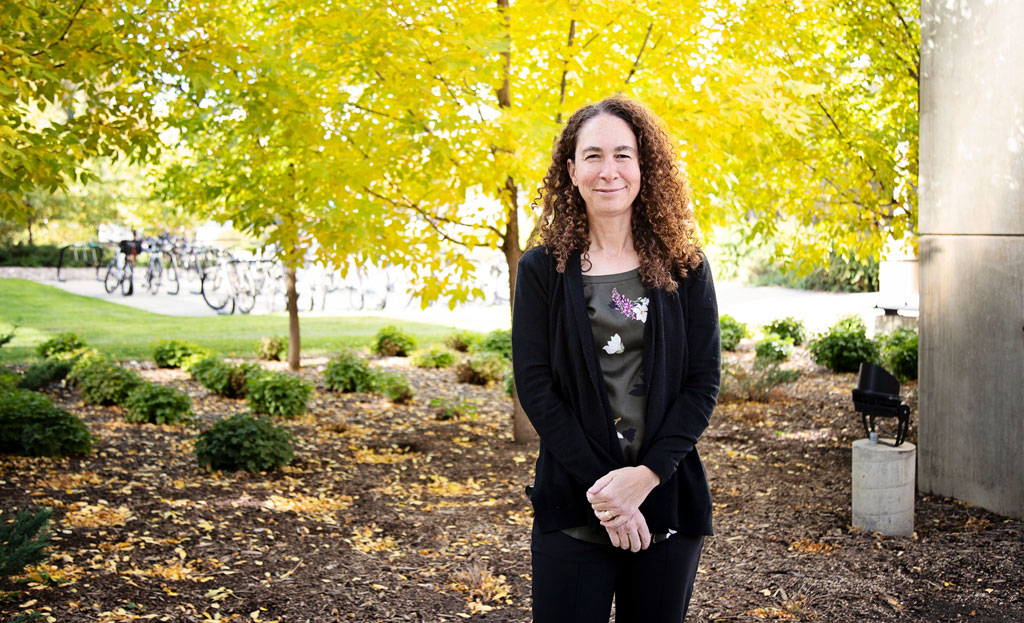
Heather Morris, PhD student at the School of Public Health.
Canada is in the midst of an overdose crisis-the likes of which we have never seen before. About two Albertans die every day from apparent accidental opioid poisoning. In addition, life expectancy in Canada has stopped increasing for the first time in four decades due in large part to the opioid crisis.
This crisis is a hot topic on social media and in the news, but who are the people behind the statistics? And who are the people they've left behind?
Heather Morris, doctor of philosophy (PhD) student and 2019 Izaak Walton Killam Memorial scholar, is doing innovative research that puts faces and names to these statistics, and the advocacy work their families are undertaking in their memory.
Morris, who is studying in the School of Public Health, is investigating the role that bereaved mothers play in addressing the epidemic of overdose deaths in Canada. Although many bereaved parents serve as advocates for prevention, treatment and harm reduction measures, this is the first research of its kind.
"Through my research, I will describe the experience of 43 bereaved mothers that are engaged in media advocacy for drug policy reform," explains Morris. "I'll investigate how bereaved mothers' advocacy work is framed in newspaper articles, explore the reach of such media advocacy and also investigate the impact of bereaved mother's media advocacy on public opinion of harm reduction measures."
This research adds to the academic knowledge around advocacy and increases our understanding about what is involved in advocacy and its impact. For example, Morris aims to address these questions:
- What facilitators and barriers exist for bereaved mothers who undertake drug policy advocacy?
- What messages are conveyed through their advocacy work?
- What is the personal impact of this work for advocates?
- How does exposure to bereaved mother's media advocacy impact public support for public health measures (e.g. harm reduction)?
Morris is hopeful this research will also be helpful for her partners, mumsDU and Moms Stop the Harm, and for health care providers, researchers and policy makers, by shedding light on how people with lived experience engage with the media and how they are portrayed in the news media.
"For example, when the media is reporting a story featuring a bereaved mother's child, are they focusing solely on the mother's personal loss and their child's drug use? Or are they also sharing messaging about proposed practice and policy changes that the mothers want to see?" asks Morris.
Additionally, Morris hopes this information will help her partners gain new knowledge and skills to support their advocacy work. She also hopes this research will allow them to be better informed on whether their media reach and engagement has the potential to impact public support for harm reduction measures.
But this research topic doesn't come without challenges.
"Not everyone views advocacy as a public health approach," says Morris. "This might be because bereaved mothers and other people with lived experience are sometimes not considered 'experts' by those who are more powerful in the system."
Morris says that the biggest challenge for her is the stigma that is still associated with substance use and harm reduction measures.
"The hardest thing for me is seeing the stigma that families and individuals have to face every day and knowing how painful that can be," explains Morris. "It is not uncommon for the mothers to advocate, have their stories shared in the media or speak at public events, and then have to read comments on social media that reinforce stigmatizing beliefs about their loved ones or other individuals living with problematic substance use."
Despite this, Morris finds the work incredibly rewarding.
"This work has changed me as a person," says Morris. "One can't spend years working with and thinking about the work of these bereaved mothers without it having a profound personal impact. It has made me more compassionate, and more understanding of people and families who struggle with substance use disorders. It has been incredibly humbling to engage and work with my community partners, and to witness the incredible strength and resilience that goes into doing what they do."
Heather Morris is one of the 2019 Izaak Walton Killam Memorial Scholarship winners at the University of Alberta. The Izaak Walton Killam Memorial Scholarship is the most prestigious graduate award administered at the University of Alberta.
Morris' research is funded by the Stollery Children's Hospital Foundation and supporters of the Lois Hole Hospital for Women, through the Women's and Children's Health Research Institute.
Her research is supervised by Elaine Hyshka, assistant professor, School of Public Health, and scientific director, Inner City Health and Wellness Program (ICHWP), Royal Alexandra Hospital; and Cameron Wild, professor, School of Public Health, and director of Canadian Research Initiative in Substance Misuse (CRISM): Prairies node.
Additional mentors include Rebecca Haines-Saah, assistant professor, Department of Community Health Sciences, Cumming School of Medicine, University of Calgary; Kathryn Dong, associate clinical professor, department of emergency medicine, Royal Alexandra Hospital, and director, ICHWP and Addiction Recovery and Community Health (ARCH) Team, Royal Alexandra Hospital; Ginetta Salvalaggio, associate professor, Department of Family Medicine, Faculty of Medicine and Dentistry, and associate scientific director, ICHWP; community partners Petra Schulz, Moms Stop the Harm, and Donna May, mumsDU; Marliss Taylor and the staff at Streetworks; ICHWP & CRISM research staff, and all of the parents that Heather has encountered in her research.